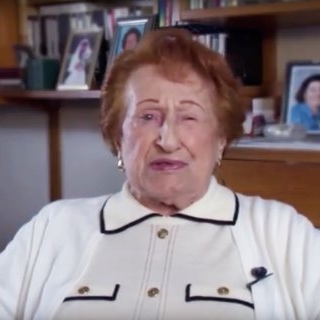click to dowload our latest edition
CLICK HERE TO SUBSCRIBE TO OUR NEWSLETTER


Published
5 years agoon
By
adminTALI FEINBERG
Though her family managed to get passes, they were destroyed by Arrow Cross thugs in the street, sealing the family’s fate. Like many Hungarian Jews, Phillips landed up being deported to Ravensbrück.
Most Hungarian Jews were herded into Auschwitz and decimated in record numbers. In fact, one tenth of all the Jews murdered in the Shoah were from Hungary.
Phillips’ story is told in a new feature-length film, The Secret Survivor, directed by Johnathan Andrews and made with the United Nations #GetPeaceProject, the Embassy of Switzerland in South Africa, the Embassy of Israel in South Africa, and the Johannesburg Holocaust & Genocide Centre.
Phillips, one of the Holocaust survivors to settle in South Africa, has rarely told her story in full before. At the start of the film, she says she does not want to take it with her to her grave, and wants to leave it for future generations.
Slowly, she shares how she lived a carefree and comfortable life as a teenager in Budapest, with her parents and younger brother. The family owned a sweet shop, and Phillips thrived at school. Yet, she describes a dark undercurrent of anti-Semitism that was part of everyday life. For example, she was not allowed to be in the school yearbook because she was Jewish. At other times, she heard classmates saying, “Jews are rats.”
At the same time, because Hungary was allied to Germany for most of the war, its Jews stayed safe while their counterparts in Poland and Lithuania were being massacred. It was only when Hungary was occupied by Nazi Germany during the end of the war that Jews began to be deported.
Meanwhile, Phillips’ father was taken for slave labour for four years – the same fate as many other Jewish men – but he survived. She and her family were made to move into a tiny flat with another family, part of the ghettoization of Jews, who were forced to live in certain buildings. However, they weren’t cut off from the rest of the city. She and her mother worked in a factory, but were not paid. They also couldn’t access their bank accounts. Survival was hand to mouth.
Then, on 1 December 1944, during the dying days of the war, Phillips and her father were suddenly deported. She describes the harrowing nine-day journey in the cattle cars in great detail, and it is difficult to watch a refined, elderly lady talking about such scenes. Then, in the coldest winter on record, she arrived at Ravensbrück, a concentration camp mainly for women that had by then also become a death camp.
The chaos of these moments is reflected in the way Phillips tells the story in the film. In spite of the infamous organisation levels of the Nazis, by then, Ravensbrück was a disordered, hellish place that was left to its own devices. Phillips was housed in a giant tent with thousands of other women. Most did not understand the language. There was no food, no toilets, and no medicine. A gas chamber had been built, and Phillips recalls how the smell of burning flesh will never leave her.
She was then taken on a “death march” – the Nazis last act to destroy the Jews of Europe. The way Phillips ultimately survived is revealed in the documentary, and the moment when she is reunited with her family is truly heartbreaking, but hopeful.
Phillips story is boosted by fascinating historical commentary from experts, including Tali Nates, the Director of the Johannesburg Holocaust & Genocide Centre. They give insight into how intense the Holocaust was in the final months of the war, and how important the Final Solution was to the Nazis, even as the Third Reich was imploding.
We learn about the tragedy of Hungary’s Jews, as diplomats desperately tried to save them in the face of relentless deportations to Auschwitz, and how so many more could have survived had the war ended earlier.
In a moving comment from Martin Schäfer (South Africa’s German Ambassador), we hear how his generation still feels guilt and responsibility for the Holocaust, and that he “bows his head in shame” to all Holocaust survivors.
Phillips survived, but the Holocaust has haunted her whole life. She suffered eight miscarriages, was never able to have children, and still holds feelings of vengeance in her heart. She never reveals that she is Jewish if she can avoid it. She did not share some aspects of her story for most of her life, even with her husband.
Yet, she managed to continue contributing to society, especially as a brilliant microbiologist and geneticist at Brunel University. She eventually moved to South Africa, where she was a lecturer in microbiology at the University of the Witwatersrand for 20 years.
Her final message is that “she will forgive, but she will not forget”, and she implores her audience to “be human”.
